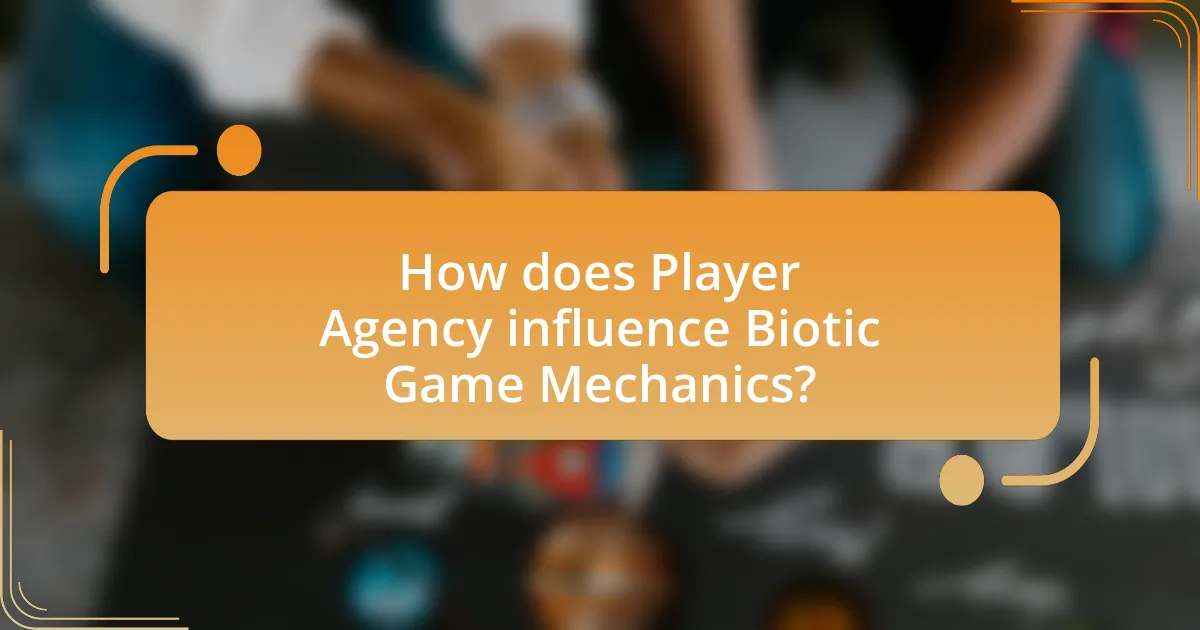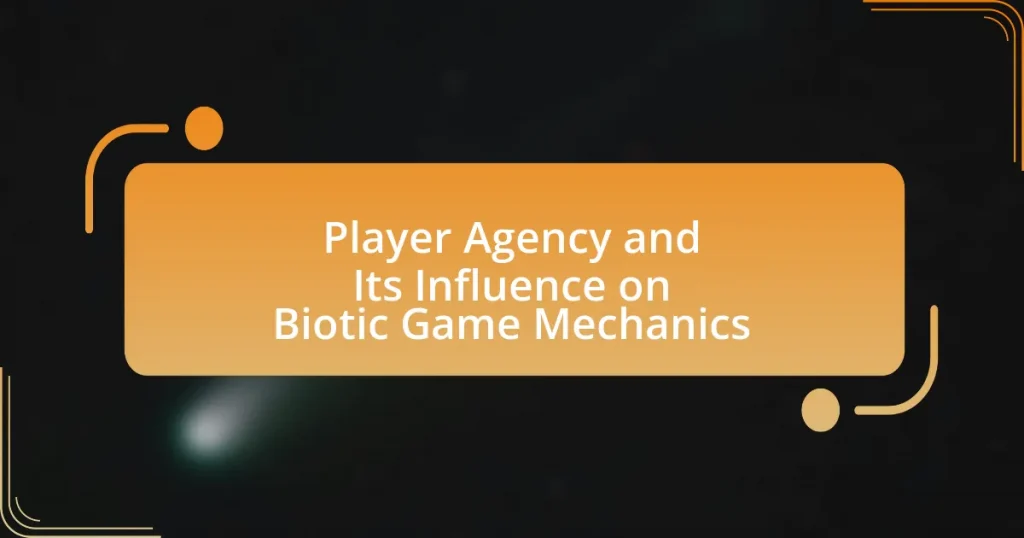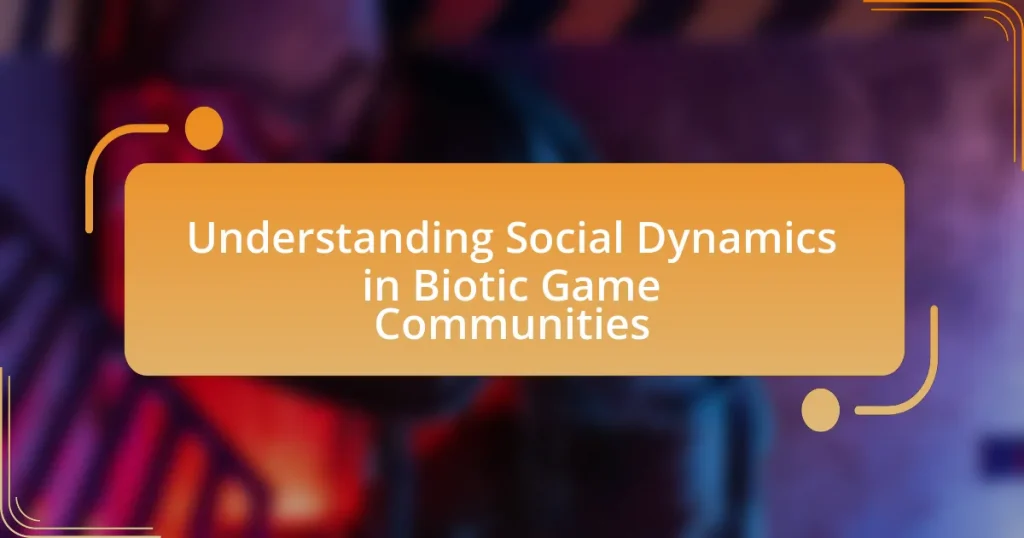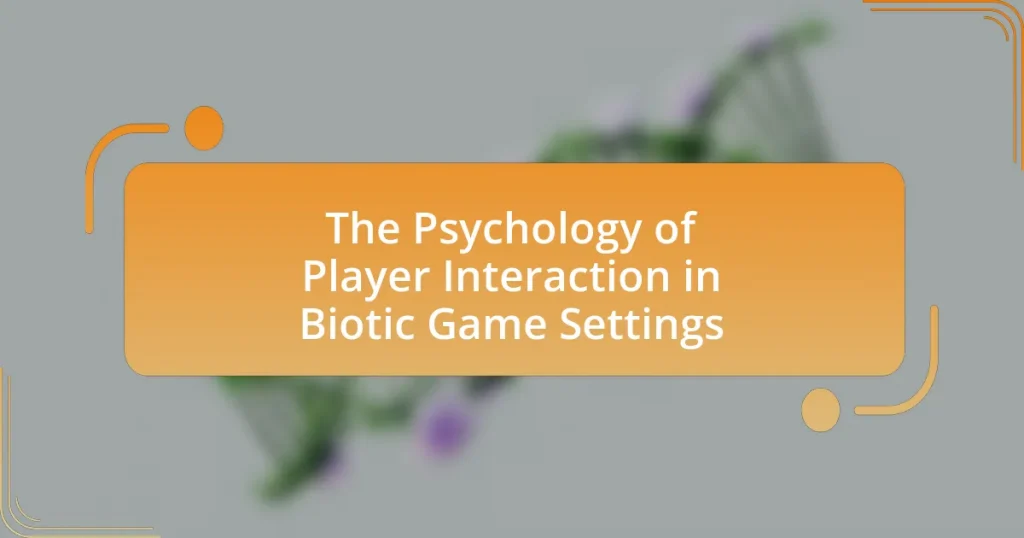Player agency in gaming refers to the level of control and influence players have over their actions and decisions, significantly impacting their engagement and satisfaction. This article explores how player agency enhances the gaming experience by allowing meaningful choices that affect gameplay outcomes, particularly in relation to biotic game mechanics. Key elements defining player agency include decision-making autonomy and the consequences of choices, which vary across different game genres. The article also examines the importance of player agency in game design, its influence on narrative development, and how it interacts with biotic mechanics to shape player strategies and overall game balance.

What is Player Agency in Gaming?
Player agency in gaming refers to the degree of control and influence a player has over their actions and decisions within a game. This concept is crucial as it directly impacts player engagement and satisfaction; games that offer higher player agency allow individuals to make meaningful choices that affect the game’s outcome. Research indicates that player agency enhances immersion and emotional investment, as players feel their decisions shape the narrative and gameplay experience. For example, games like “The Witcher 3” and “Mass Effect” are noted for their branching storylines that respond to player choices, illustrating how player agency can lead to diverse gameplay experiences.
How does Player Agency impact player experience?
Player agency significantly enhances player experience by allowing individuals to make meaningful choices that affect gameplay outcomes. When players feel they have control over their actions and decisions, it leads to increased engagement and satisfaction. Research indicates that games designed with high player agency, such as “The Witcher 3: Wild Hunt,” provide players with diverse narrative paths and outcomes, resulting in a more immersive experience. This sense of ownership fosters emotional investment in the game, as players perceive their choices as impactful, thereby enhancing overall enjoyment and replayability.
What are the key elements that define Player Agency?
Player agency is defined by the ability of players to make meaningful choices that affect their gameplay experience. Key elements that define player agency include decision-making autonomy, the impact of choices on game outcomes, and the presence of feedback mechanisms that inform players about the consequences of their actions. For instance, in games like “The Witcher 3,” players can choose different dialogue options that lead to various story outcomes, demonstrating how player choices directly influence narrative progression. This autonomy enhances engagement and investment in the game world, as players feel their actions have tangible effects.
How does Player Agency vary across different game genres?
Player agency varies significantly across different game genres, influencing how players interact with game mechanics and narrative. In role-playing games (RPGs), players often experience high agency through character customization, decision-making, and branching storylines, allowing for personal investment in the game world. Conversely, in linear narrative games, player agency is limited as the story unfolds in a predetermined manner, restricting choices and outcomes.
In strategy games, player agency is expressed through tactical decision-making and resource management, where players can influence the game’s outcome based on their strategic choices. In contrast, first-person shooters typically offer less agency in narrative but high agency in gameplay mechanics, allowing players to choose weapons and tactics while following a set storyline.
These variations highlight how different genres prioritize player agency differently, shaping the overall gaming experience. For example, a study by Przybylski and Weinstein (2019) in the journal “Computers in Human Behavior” found that higher levels of player agency correlate with increased player satisfaction and engagement, demonstrating the importance of agency in diverse gaming contexts.
Why is Player Agency important in game design?
Player agency is important in game design because it empowers players to make meaningful choices that affect their gameplay experience. This sense of control enhances player engagement and satisfaction, as individuals feel their decisions have real consequences within the game world. Research indicates that games with high levels of player agency lead to increased immersion and enjoyment, as players are more likely to invest time and effort into a game where they can influence outcomes. For example, a study by Ryan et al. (2006) found that player autonomy significantly correlates with overall enjoyment and motivation in gaming. Thus, incorporating player agency is essential for creating compelling and interactive game experiences.
How does Player Agency influence player engagement?
Player agency significantly enhances player engagement by allowing individuals to make meaningful choices that affect their gameplay experience. When players feel they have control over their actions and decisions, they are more likely to invest emotionally and cognitively in the game. Research indicates that games designed with high levels of player agency, such as open-world titles, lead to increased satisfaction and immersion, as players can tailor their experiences to their preferences. For instance, a study by Przybylski et al. (2014) found that autonomy in gameplay correlates with higher levels of enjoyment and motivation, demonstrating that player agency is a critical factor in fostering deeper engagement.
What role does Player Agency play in narrative development?
Player agency significantly influences narrative development by allowing players to make choices that shape the story’s direction and outcome. This interactivity enhances engagement, as players feel a sense of ownership over the narrative, leading to a more immersive experience. Research indicates that games with high player agency, such as “The Witcher 3,” demonstrate how player decisions can lead to multiple endings and character arcs, thereby enriching the narrative complexity. This dynamic not only fosters emotional investment but also encourages replayability, as players explore different choices and their consequences.

What are Biotic Game Mechanics?
Biotic game mechanics are systems within video games that simulate biological processes, influencing gameplay through elements such as health regeneration, resource management, and environmental interactions. These mechanics often enhance player agency by allowing players to make strategic decisions based on the biological attributes of characters or ecosystems, thereby affecting their success in the game. For instance, in games like “Mass Effect,” biotic abilities allow players to manipulate the environment and enemies, showcasing how biotic mechanics can directly impact gameplay dynamics and player choices.
How do Biotic Game Mechanics function within gameplay?
Biotic game mechanics function within gameplay by allowing players to manipulate biological elements, such as health regeneration, status effects, and environmental interactions. These mechanics enhance player agency by providing strategic options that influence combat and exploration. For instance, in games like “Mass Effect,” biotic abilities enable players to lift enemies or create barriers, directly impacting the flow of battle and encouraging diverse tactical approaches. This integration of biotic mechanics not only enriches gameplay but also fosters a deeper connection between player choices and in-game outcomes, reinforcing the importance of player agency in shaping the gaming experience.
What types of Biotic Game Mechanics exist?
Biotic game mechanics primarily include health regeneration, resource gathering, and environmental interactions. Health regeneration allows players to recover health over time or through specific actions, enhancing survival and engagement. Resource gathering mechanics enable players to collect items or materials from the environment, which can be used for crafting or upgrades, thus influencing gameplay strategies. Environmental interactions involve players manipulating or utilizing elements within the game world, such as using flora and fauna for advantages, which can significantly affect player agency and decision-making. These mechanics are foundational in shaping player experiences and strategies in biotic gameplay contexts.
How do Biotic Game Mechanics enhance player interaction?
Biotic game mechanics enhance player interaction by creating dynamic environments that respond to player actions, fostering a sense of agency and immersion. These mechanics often involve elements such as health regeneration, environmental effects, or character abilities that change based on player choices, which directly influence gameplay outcomes. For instance, in games like “Mass Effect,” biotic powers allow players to manipulate the battlefield, encouraging strategic thinking and collaboration with other players. This interactivity not only deepens engagement but also promotes social interaction, as players must communicate and coordinate their actions to maximize the effectiveness of biotic abilities.
Why are Biotic Game Mechanics significant in modern gaming?
Biotic game mechanics are significant in modern gaming because they enhance player agency by allowing players to manipulate in-game environments and characters through biological or organic interactions. This interactivity fosters deeper engagement, as players can experience a sense of control over their actions and the game world. For instance, games like “Mass Effect” utilize biotic powers to create dynamic combat scenarios, enabling players to influence the battlefield strategically. This not only enriches gameplay but also contributes to narrative development, as player choices can lead to varied outcomes, reinforcing the importance of player agency in shaping the gaming experience.
How do Biotic Game Mechanics contribute to game balance?
Biotic game mechanics contribute to game balance by ensuring that player actions have meaningful consequences within the game environment. These mechanics often involve health regeneration, resource management, or environmental interactions that can influence gameplay dynamics. For instance, in games like “Overwatch,” biotic abilities allow players to heal or buff teammates, which can shift the momentum of a match and create a more equitable playing field. This balance is crucial as it prevents any single player or strategy from dominating the game, thereby enhancing the overall player experience and engagement.
What impact do Biotic Game Mechanics have on player strategy?
Biotic game mechanics significantly influence player strategy by introducing elements that require adaptive decision-making and resource management. Players must consider the effects of biotic abilities, such as healing or buffs, on their overall gameplay approach, often leading to more collaborative strategies in team-based environments. For instance, in games like “Overwatch,” characters with biotic abilities encourage players to prioritize support roles, thereby altering team dynamics and individual playstyles. This shift in strategy is supported by research indicating that biotic mechanics enhance player engagement and cooperation, as seen in studies analyzing multiplayer interactions and team performance metrics.

How does Player Agency influence Biotic Game Mechanics?
Player agency significantly influences biotic game mechanics by allowing players to make meaningful choices that affect gameplay outcomes. When players have the ability to control their actions and decisions, they can engage with biotic mechanics—such as healing, buffs, or debuffs—in ways that align with their strategies and play styles. For instance, in games like “Mass Effect,” player choices regarding biotic powers can lead to different combat scenarios, enhancing the overall experience and effectiveness of these mechanics. This interaction between player agency and biotic mechanics fosters a dynamic environment where player decisions directly impact the effectiveness and application of biotic abilities, thereby reinforcing the importance of agency in gameplay.
In what ways does Player Agency shape the effectiveness of Biotic Game Mechanics?
Player agency significantly shapes the effectiveness of biotic game mechanics by allowing players to make meaningful choices that directly impact gameplay outcomes. When players have the autonomy to decide how and when to utilize biotic abilities, it enhances their engagement and investment in the game. For instance, in games like “Mass Effect,” players can choose different biotic powers and their timing, which can lead to varied strategies and experiences. This choice not only affects the immediate gameplay but also influences long-term character development and narrative outcomes, reinforcing the importance of player agency in maximizing the potential of biotic mechanics.
How can Player Agency enhance the implementation of Biotic Game Mechanics?
Player agency enhances the implementation of biotic game mechanics by allowing players to make meaningful choices that directly affect gameplay outcomes. When players have the ability to influence their environment and character abilities, it fosters a deeper engagement with biotic mechanics, such as health regeneration or resource management. For instance, in games like “Mass Effect,” player choices regarding biotic powers can lead to varied combat strategies and narrative outcomes, demonstrating how agency can lead to diverse gameplay experiences. This interaction not only increases player satisfaction but also encourages experimentation with different biotic mechanics, ultimately enriching the overall game design.
What challenges arise when balancing Player Agency with Biotic Game Mechanics?
Balancing Player Agency with Biotic Game Mechanics presents challenges such as ensuring player freedom while maintaining game balance. Player Agency allows individuals to make meaningful choices, which can conflict with Biotic Game Mechanics that often dictate specific actions or outcomes. For instance, if a game heavily favors biotic abilities, it may limit player choices, leading to frustration and a feeling of reduced agency. Conversely, excessive player freedom can undermine the effectiveness of biotic mechanics, resulting in a lack of strategic depth. This tension requires careful design to create a gameplay experience that feels both empowering and cohesive, as evidenced by games like “Mass Effect,” where developers had to navigate these dynamics to enhance player engagement while preserving the integrity of biotic systems.
What are the implications of Player Agency on game design choices?
Player agency significantly influences game design choices by allowing players to make meaningful decisions that affect gameplay and narrative outcomes. This autonomy leads designers to create more dynamic and responsive game environments, where player choices can alter storylines, character development, and game mechanics. For instance, games like “The Witcher 3” and “Mass Effect” showcase how player agency can lead to multiple endings and varied character interactions, demonstrating that incorporating player choices can enhance engagement and replayability. Research by Ryan and Deci (2000) in “Intrinsic and Extrinsic Motivations: Classic Definitions and New Directions” highlights that player agency fosters intrinsic motivation, which is crucial for player satisfaction and retention. Thus, the implications of player agency on game design are profound, shaping how games are structured and experienced.
How can designers create a harmonious relationship between Player Agency and Biotic Game Mechanics?
Designers can create a harmonious relationship between Player Agency and Biotic Game Mechanics by ensuring that player choices meaningfully impact gameplay while integrating biotic mechanics that enhance those choices. This can be achieved through systems that allow players to utilize biotic abilities in ways that align with their strategic decisions, thereby reinforcing the significance of player agency. For instance, in games like “Mass Effect,” players can choose different biotic powers that not only affect combat outcomes but also influence narrative paths, demonstrating how player decisions can shape both mechanics and story. This integration fosters a sense of empowerment and investment in the game world, ultimately leading to a more engaging experience.
What best practices should developers follow to optimize Player Agency in Biotic Game Mechanics?
Developers should prioritize meaningful choices, responsive feedback, and player-driven narratives to optimize Player Agency in Biotic Game Mechanics. Meaningful choices empower players by allowing them to influence game outcomes, enhancing their sense of control. Responsive feedback ensures that players understand the consequences of their actions, reinforcing their agency. Additionally, player-driven narratives create immersive experiences where players feel their decisions shape the story, further enhancing engagement. Research indicates that games with high player agency lead to increased satisfaction and retention, as players feel more invested in their experiences.
What strategies can players use to maximize their agency within Biotic Game Mechanics?
Players can maximize their agency within Biotic Game Mechanics by actively engaging in decision-making processes that influence gameplay outcomes. This involves understanding the mechanics of biotic abilities, such as timing and resource management, to effectively utilize them in various scenarios. For instance, players can enhance their agency by experimenting with different combinations of biotic powers to discover synergies that yield greater effects, thereby allowing for more strategic gameplay. Additionally, players should focus on situational awareness to adapt their strategies based on the evolving dynamics of the game environment, which can lead to more impactful decisions. Research indicates that player agency is significantly enhanced when players feel they have control over their actions and the consequences of those actions, reinforcing the importance of strategic experimentation and adaptability in maximizing agency within biotic mechanics.



